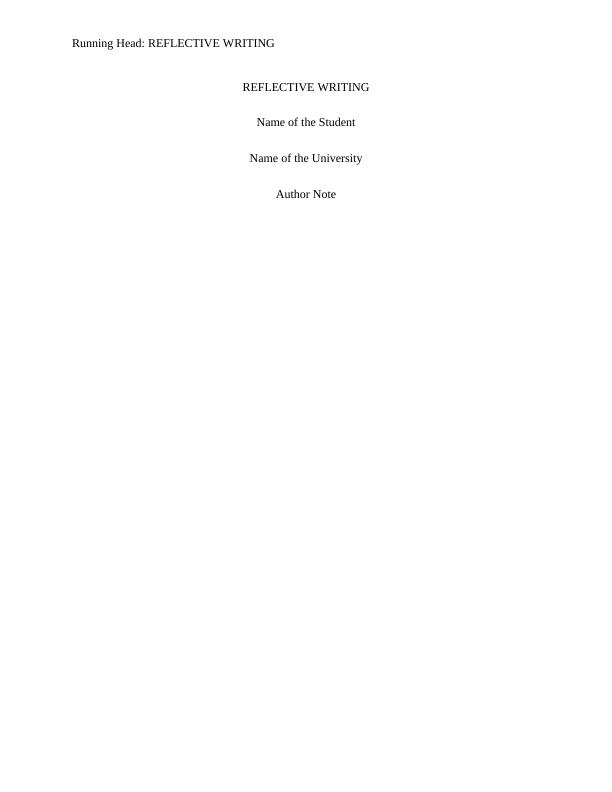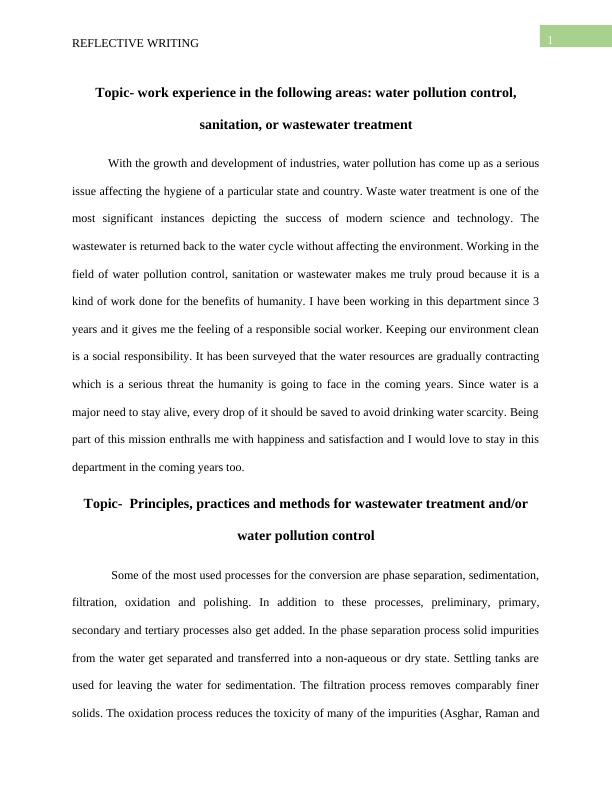Reflective Writing on Water Pollution Control, Sanitation, and Wastewater Treatment
Added on 2023-06-08
5 Pages1228 Words185 Views
Running Head: REFLECTIVE WRITING
REFLECTIVE WRITING
Name of the Student
Name of the University
Author Note
REFLECTIVE WRITING
Name of the Student
Name of the University
Author Note

1REFLECTIVE WRITING
Topic- work experience in the following areas: water pollution control,
sanitation, or wastewater treatment
With the growth and development of industries, water pollution has come up as a serious
issue affecting the hygiene of a particular state and country. Waste water treatment is one of the
most significant instances depicting the success of modern science and technology. The
wastewater is returned back to the water cycle without affecting the environment. Working in the
field of water pollution control, sanitation or wastewater makes me truly proud because it is a
kind of work done for the benefits of humanity. I have been working in this department since 3
years and it gives me the feeling of a responsible social worker. Keeping our environment clean
is a social responsibility. It has been surveyed that the water resources are gradually contracting
which is a serious threat the humanity is going to face in the coming years. Since water is a
major need to stay alive, every drop of it should be saved to avoid drinking water scarcity. Being
part of this mission enthralls me with happiness and satisfaction and I would love to stay in this
department in the coming years too.
Topic- Principles, practices and methods for wastewater treatment and/or
water pollution control
Some of the most used processes for the conversion are phase separation, sedimentation,
filtration, oxidation and polishing. In addition to these processes, preliminary, primary,
secondary and tertiary processes also get added. In the phase separation process solid impurities
from the water get separated and transferred into a non-aqueous or dry state. Settling tanks are
used for leaving the water for sedimentation. The filtration process removes comparably finer
solids. The oxidation process reduces the toxicity of many of the impurities (Asghar, Raman and
Topic- work experience in the following areas: water pollution control,
sanitation, or wastewater treatment
With the growth and development of industries, water pollution has come up as a serious
issue affecting the hygiene of a particular state and country. Waste water treatment is one of the
most significant instances depicting the success of modern science and technology. The
wastewater is returned back to the water cycle without affecting the environment. Working in the
field of water pollution control, sanitation or wastewater makes me truly proud because it is a
kind of work done for the benefits of humanity. I have been working in this department since 3
years and it gives me the feeling of a responsible social worker. Keeping our environment clean
is a social responsibility. It has been surveyed that the water resources are gradually contracting
which is a serious threat the humanity is going to face in the coming years. Since water is a
major need to stay alive, every drop of it should be saved to avoid drinking water scarcity. Being
part of this mission enthralls me with happiness and satisfaction and I would love to stay in this
department in the coming years too.
Topic- Principles, practices and methods for wastewater treatment and/or
water pollution control
Some of the most used processes for the conversion are phase separation, sedimentation,
filtration, oxidation and polishing. In addition to these processes, preliminary, primary,
secondary and tertiary processes also get added. In the phase separation process solid impurities
from the water get separated and transferred into a non-aqueous or dry state. Settling tanks are
used for leaving the water for sedimentation. The filtration process removes comparably finer
solids. The oxidation process reduces the toxicity of many of the impurities (Asghar, Raman and

End of preview
Want to access all the pages? Upload your documents or become a member.
Related Documents
Assignment On Wastewater Treatmentlg...
|16
|4362
|28
